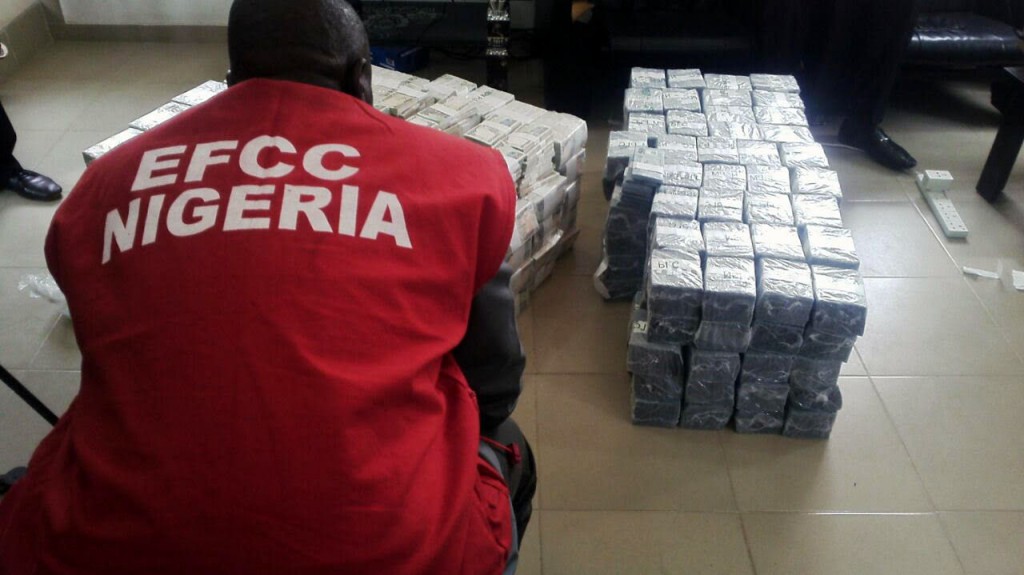Featured
EFCC and the Parable of the Dirty Soap
When the Economic and Financial Crimes Commission (EFCC) was created by the administration of President Olusegun Obasanjo, the vision was to have an anti-graft agency which will deal decisively with the hydra-headed monster called corruption. It was also the aim to Trace, Track and Recover funds looted by corrupt public officials which will then be applied for the overall benefit of Nigerians.
About 15 years after the advent of the commission however, the EFCC has become a metaphor of what it sought to curb. The EFCC seems to have become the most corrupt agency in the annals of Nigeria and like a wise man once said, when the soap is dirty, what shall be used in washing it?
Corruption, is a nebulous term that lends itself to several definitions and interpretations. But a consensus seem to have been forged around the fact that it is the failure to observe the due process of law, probity, accountability and transparency in the discharge of a public duty. Corruption is widely and most commonly manifested in the embezzlement and misappropriation of public funds, favoritism, cronyism, nepotism and other acts that undermine the trust of a public office. Due to its prevalence in virtually all sectors of the country, corruption has been described as the 37th state in Nigeria as well as the largest, most populous and wealthiest.
Everyday, the EFCC is reported to have recovered huge sums of money from past and present political office holders. Worthy of mention is the endless stream of the Abacha loot, the Tafa Balogun loot, the DSP Alamieyesigha loot, the Cecilia Ibru loot etc. In recent times, there have also been reports of orphaned monies recovered from farms, septic tanks, warehouses and safe houses. The total sum of money recovered by the commission over the past fifteen years is reported to be over Five Trillion Naira. This of course is a conservative estimate as even the EFCC does not know. This was the submission of Mr. Ibrahim Magu Acting Chairman of the EFCC to the Senate and indeed the nation in March 2017. “All the sums recovered have not been accounted for.” There are reports that the funds are being re-looted by the same EFCC. These reports which has never been challenged or refuted by the EFCC is strengthened by the secrecy, obscurity and lack of transparency in the management of the funds being proceeds of corruption. Never has there been a reported revenue paid into the federation account from this fund.
Nigerians would recall in 2015 when one George Uboh wrote a petition to the Senate of the Federal Republic of Nigeria alleging that the Chairman of the EFCC had embezzled over One Trillion Naira from proceeds of corruption. This allegation was never denied. Again, the present chairman of the EFCC has been accused by the Department of State Services (DSS) of maintaining a lavish and corrupt lifestyle which cannot be justified by his remuneration as a Police officer. Instead of preferring explanation as to this damning allegation, the EFCC and its Chairman have only sought to silence critical media houses as well as proffer the lame excuse that corruption is fighting back.
This is the same response each time valid questions are asked by Nigerians. Where are these monies being proceeds of corruption kept? In the words of Chief Mike Ozekhome SAN, are the monies kept with the Central Bank of Nigeria, Commercial Banks, ware houses, abandoned houses, shopping complexes, canals, cemeteries, airports, septic tanks, toilets, private accounts, official pockets, or is it lost? Is the TSA still operative, and if so, does it operate with relation to these “recovered loots” or are these monies specially exempted from the operation of TSA?.
In the eyes of Nigerians, the EFCC of today especially its top echelon is just another agency reeking from the horrible and putrid stench of corruption. It is therefore time for the EFCC to purge itself of this self-inflicted integrity and existential crisis by living up to its mandate.
A comprehensive audit must be conducted to tell Nigerians how much the EFCC has recovered since it came into being. The monies should then be disbursed as special allocations to national legacy projects such as the construction of a refinery, low-cost housing schemes or even as salary bonuses to civil servants.
Secondly, a publication of the names of individuals and exact amount recovered would be the most transparent manner that this should be done. Next, the commission must imbibe a new orientation that their ultimate duty is to the peoples of Nigeria and not just the government in power.
If the EFCC should continue on this path of secrecy in the handling of proceeds of corruption, it may sooner than later find itself unworthy to bear the name, the Economic and Financial Crimes Commission.
All rights reserved ©Asaba Metro. Permission to use this publication (The Periscope ) is granted subject to appropriate credit being given to the Author Favour Chukwunoyenim and www.asabametro.com as the source.































